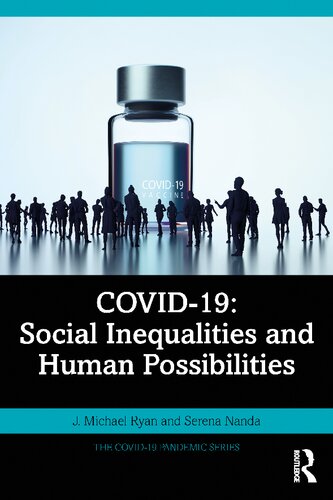

Most ebook files are in PDF format, so you can easily read them using various software such as Foxit Reader or directly on the Google Chrome browser.
Some ebook files are released by publishers in other formats such as .awz, .mobi, .epub, .fb2, etc. You may need to install specific software to read these formats on mobile/PC, such as Calibre.
Please read the tutorial at this link: https://ebookbell.com/faq
We offer FREE conversion to the popular formats you request; however, this may take some time. Therefore, right after payment, please email us, and we will try to provide the service as quickly as possible.
For some exceptional file formats or broken links (if any), please refrain from opening any disputes. Instead, email us first, and we will try to assist within a maximum of 6 hours.
EbookBell Team

4.8
34 reviewsCOVID-19: Social Inequalities and Human Possibilities examines the unequal impact of the COVID-19 pandemic on individuals, communities, and countries, a fact seldom acknowledged and often suppressed or invisible. Taking a global approach and including a comprehensive timeline, this book demonstrates how the impact of the pandemic has differed as a result of social inequalities, such as economic development, social class, race and ethnicity, and access to health care and education. The book concludes with cautious optimism and insights into how global society can (re-)build a brighter post-COVID-19-pandemic world.
Economic inequality between and within nations has significantly contributed to the chances of individuals contracting and dying from the virus. Developing nations with weak health care systems, workers whose jobs cannot be performed remotely, the differences between those with and without access to soap and water to wash their hands, or the ability to practice physical distancing, also account for the unequal impact of the virus. Racial and ethnic minorities experience higher death rates from the virus, which has also unequally affected indigenous peoples and urban and foreign migrants around the world. Inequality is also embedded in national and international responses to the pandemic, as giving and receiving aid is often impacted by inequalities of demographic and national power and influence, resulting in national and global competition rather than the collaboration needed to end the pandemic.
Along with the other titles in Routledge’s The COVID-19 Pandemic series, this book represents a timely and critical advance in knowledge related to what many believe to be the greatest threat to global ways of being in more than a century.COVID-19: Social Inequalities and Human Possibilities is therefore indispensable for academics, researchers, and students as well as activists and policy makers interested in understanding the social impact of the COVID-19 pandemic and eradicating the inequalities it has exacerbated.